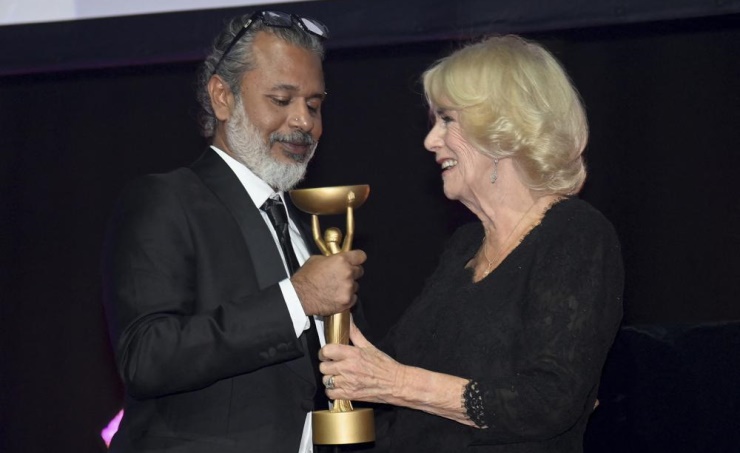LONDON, Oct. 19 (BNA) Writer Sheehan Karunatilaka won the prestigious Booker Prize for Fiction on Monday for “The Seven Moons of Maali Almeida”, an “after-life” satire set during Sri Lanka’s brutal civil war.
Karunatilaka, one of Sri Lanka’s leading authors, won a £50,000 ($57,000) prize for his second novel. The 47-year-old, who has also written journalism, children’s books, screenplays and rock songs, is the second Sri Lankan-born Booker winner, after Michael Ondaatje, who took home the trophy in 1992 for “The English Patient”.
Karunatilaka received the award from Camilla, Queen of Britain, during a gala at the Roundhouse Concert Hall in London, The Associated Press reports.
The judges’ unanimous choice, “The Seven Moons of Maali Almeida” is a dark humorous story about a murdered war photographer investigating his death and trying to secure the legacy of his life.
Karunatilaka said Sri Lankans are “specialists in gallows humor and crisis-ridden jokes”.
“It is our coping mechanism,” he said, and hoped that one day his account of war and racial division would be “in the fiction section of the library.”
Neil MacGregor, former director of the British Museum, who chaired the jury, said the judges chose the book for “aspiration, scope, skill, daring, daring, and the playfulness of execution”.
“It’s a book that takes the reader on a rollercoaster ride through life and death, right into what the author describes as the dark heart of the world,” said MacGregor. “And there the reader finds their surprise, joy, tenderness, love and loyalty.”
The winner was chosen from among five finalists: American authors Percival Everett for “The Trees” and Elizabeth Strout for “Oh William!” ; “Glory” directed by NoViolet Bulawayo in Zimbabwe; “Little Things Like This” by Irish writer Claire Keegan; and “Treacle Walker” by British writer Alan Garner.
Karunatilaka commended his fellow authors for the long list of 13 books and the shortlist of six books for the award.
“It was a ride from hell,” he said, “and I was expecting to get off at every stop.”
The five-member jury read 170 novels before choosing the winner. All of the books, MacGregor said, explored the actions of individuals in a world “where fixed points move and disintegrate”.
“What is striking about all of them is the weight of history” — from the legacy of racism in the United States to colonialism and oppression in Zimbabwe — and how it shapes individuals’ choices and actions, he said.
“I think history as a player in contemporary politics is one of the things that emerges from most abridged books,” MacGregor said. “And this is not surprising, given the current debates about history.”
“All of these books show why (history) must be taught, addressed and discussed – because otherwise we cannot understand the framework within which people have to make the big choices, the fundamental choices, in their lives,” he said.
Founded in 1969, the Booker Prize is known for changing the professions of writers. It was originally open to British, Irish and Commonwealth writers but eligibility was expanded in 2014 to include all English-language novels published in the UK
Last year’s winner was “The Promise” by South African director Damon Galgot.
The event was the first all-personal poker celebration since a pre-pandemic event in 2019 and the first for longtime literacy champion Camilla since her husband became King Charles III last month following the death of his mother, Queen Elizabeth II.
The event also included a speech by singer-songwriter Dua Lipa about her love of reading, and a reflection from writer Elif Shafak on what the attack on novelist Salman Rushdie, who was stabbed on stage in August, means to writers around the world.
